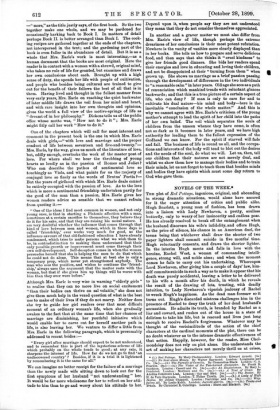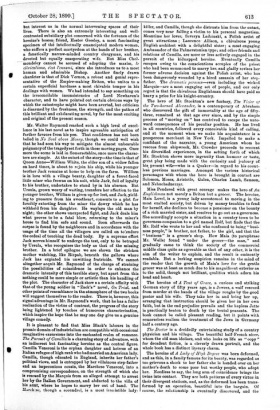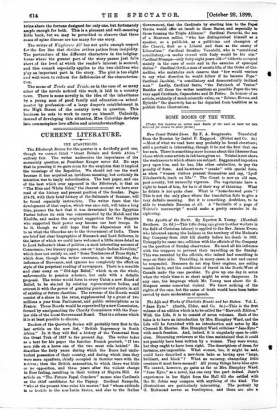NOVELS OF THE WEEK.*
THE plot of Red Pottage, ingenious, original, and abounding in strong dramatic situations, would alone have secured for it the eager attention of critics and public alike. Hugh Scarlett, a young man of fashion, has been drawn into a liaison with Lady Newhaven, a pretty, soulless butterfly, only to weary of her insincerity and endless pose. He has already resolved to break off the entanglement when the husband discovers his wife's infidelity, and offers Hugh, as the price of silence, his chance in an American duel, the terms being that whichever shall draw the shorter of two paper lighters shall commit suicide in five months' time. Hugh reluctantly consents, and draws the shorter lighter. In the interim Hugh meets and falls in love with the heroine, Rachel West, a woman of commanding intelli- gence, strong will, and noble aims; and when the moment comes he fails to carry out his undertaking. Whereupon Lord Newhaven, after giving him a couple of days' law, him- self commits suicide in such a way as to make it appear that his death was purely accidental, leaving a letter to be delivered to his wife a month after his death, in which he reveals the result of the drawing of lots, trusting, with deadly intuition, to Lady Newhaven's viperish jealousy of Rachel to wreck Hugh's happiness. As the dead man foresaw so it tarns out. Hugh's discarded mistress challenges him in the presence of Rachel to deny the truth of her dead husband's accusation. He admits its truth, is branded by Rachel as a liar and coward, and rushes out of the house in a state of delirium to take his life, but is rescued and lives just long enough to receive Rachel's forgiveness. Whatever may be thought of the verisimilitude of the action of the chief characters at the cardinal moments of the plot, there can be no doubt whatever as to the intense dramatic effectiveness of that action. Happily, however, for the reader, Miss Chol- mondeley does not rely on plot alone. She understands the art of making her characters not merely thrill us at crises, • (1.) Reel Pottage. By Mary Cholmondeley. London : Edward Arnold. [Gs.] —(2.) No Soul above Money. By Walter Raymond. London : Longmans and Co. (6s.]—(3.) 7'he Pursuit of Camilla. By Clementina Black. London : C. A. Pearson. [6a.)—(4.) The Vizier of the Two-horned Alexander. By Frank R. Stockton. London Cassell and Co [68.]—(5.) An Englishman. By Mary L. rendered. London : Methuen and Co. [68.]—(6.) A Tent of Grace. By Adelina Cohnfeldt Lust. London Gay and Bird. [6s.]—(7.) The Doctor. By H. de Vera Staepoole. London : T. Fisher Unattn. [6s.]—(13.) A Lady of High Degree. By Jennie Chappell. London : Partridge and Co. [6s.] (9.) Way- farers Alt. By Leslie Keith. London : Jarrold and Co. [ss.3—(ie.) Tricks and Fiats. By Cliristabel R. Coleridge. London : Hurst and Blackett. Pkt] but interest us in the normal intervening spaces of their lives. There is also an extremely interesting and well- contrasted subsidiary plot concerned with the fortunes of the heroine's bosom) friend, Hester Greeley, a moat fascinating specimen of th‘ intellectually emancipated modern woman, who suffers a perfect martyrdom at the hands of her brother, a fanatically narrow-minded country clergyman, and his devoted but equally exasperating wife. But Miss Choi-
• mondeley cannot be accused of adopting the maxim, le clericalisme, c'est l'ennemi, since she introduces us to a most human and admirable Bishop. Another finely drawn oharticter is that of Dick Vernon, a robust and genial repre- sentative of the Empire-making Briton, who unites to a certain superficial hardness a most chivalric temper in his dealings with women. We had intended to say something on the irreconcilable inconsistencies of Lord Newhaven's character, and to have pointed out certain obvious ways by which the catastrophe might have been averted, but criticism is disarmed by the freshness, the strength, and the pathos of this brilliant and exhilarating novel, by far the most exciting and original of the present season.
Hr. Walter Raymond reached such a high level of excel- lence in his last novel as to inspire agreeable anticipation of farther favours from his pen. That confidence has not been belied in No Soul above Money, though we could well wish that he had seen his way to mitigate the almost unbearable poignancy of the tragedy set forth in these moving pages. Once more the scene is laid in Somersetshire, once more the charac- ters are simple. At the outset of the story—the time is that of Queen Anne—William White, the elder son of a widow fallen on hard times, is about to rejoin his ship, while his younger brother Jack remains at home to help on the farm. William is in love with a village beauty, daughter of a ferret-faced little miser who frowns on his suit, while Jack, full of loyalty to his brother, undertakes to stand by in his absence. But Ursula, grown weary of waiting, transfers her affection to the younger brother, William is given up for lost, and Jack, yield- ing to pressure from his sweetheart, consents to a plot for forcibly extorting from the miser the dowry which he has withheld from his daughter. He waylays the old man by night; the other shows unexpected fight, and Jack deals him what proves to be a fatal blow, returning to the miser's house to find him safe and sound. Soon afterwards the corpse is found by the neighbours and in accordance with the usage of the time all the villagers are called on to:endure the ordeal of touching the dead body. By a supreme effort Jack nerves himself to undergo the test, only to be betrayed by Ursula, who recognises the body as that of the missing brother. In a brief epilogue we are shown the stricken mother watching, like Rizpab, beneath the gallows where Jack has expiated his unwitting fratricide. We cannot altogether acquit Mr. Raymond of the charge of straining the possibilities of coincidence in order to enhance the dramatic intensity of this terrible story, but apart from this nothing could be more simple or artistic than his handling of the plot. The character of Jack show s a certain affinity with that of the young soldier in " Zack's " novel, On Trial, and other points of resemblance in the atmosphere of the two books will suggest themselves to the reader. There is, however, this signal advantage in Mr. Raymond's work, that he has a faller realisation of the virtue of contrast, the progress of the story being lightened by touches of humorous characterisation, which inspire the hope that he may one day give us a genuine village comedy.
It is pleasant to find that Miss Black's labours in the prosaic domain of industrialism are compatible with occasional imaginative excursions into the enchanted realm of romance. The Pursuit of Camilla is a charming story of adventure, with an indiscreet but fascinating heroine as the central figure. Camilla Veneroni is the orphan daughter and heiress of an Italian refugee of high rank who had married an American lady. Camilla, though educated in England, inherits her father's political views, and is entrapped by her villainous step-father and an impecunious cousin, the Marchese Veneroni, into a compromising correspondence, on the strength of which she is rescued by the Marquis from an alleged attempt to arrest her by the Italian Government, and abducted to the villa of his and, where he hopes to marry her out of hand. The Marehzee, though a scoundrel, is a most irresistible lady- killer, and Camilla, though she distrusts him from the outset, comes very near falling a victim to his personal magnetism. Meantime her lover, Severyn Ladzineki, a Polish artist of great attractions ; Laurence Allison, a chivalrous young English architect with a delightful sister; a most engaging Ambassador of the Palmeratonian type; and other friends and relations of Camilla, are more or less actively engaged in the pursuit of the kidnapped heroine. Eventually Camilla escapes owing to the conscientious scruples of the priest who had been summoned to marry her, and gladly revises her former adverse decision against the Polish artist, who has been dangerously wounded by a hired assassin of her step- father. The dramatis persona—even including the wicked Marquis—are a moot engaging set of people, and our only regret is that the chivalrous Englishman should have paid so heavy a price for his knight-errantry.
The hero of Mr. Stockton's new fantasy, The Vizier of the Two-horned Alexander, is a contemporary of Abraham who discovered the gift of immortality at the age of fifty- three, remained at that age ever since, and by the simple process of "moving on" has contrived to escape the unto- ward consequences of his peculiar position. He has lived in all countries, followed every conceivable kind of calling, and at the moment when we make his acquaintance is a prosperous merchant in New York. Impelled to make a confidant of the narrator, a young American whom he rescues from shipwreck, Mr. Crowder proceeds to recount his diversified experiences, in the setting forth of which Mr. Stockton shows more ingenuity than humour or taste, great play being made with the curiosity and jealouv of his, present wite—who is a Quaker—in regard to his count- less previous marriages. Amongst the various historical personages with whom the hero is brought in contact are Solomon, Moses, Aristotle, Galen, Charles Lamb, Samson, and Nebuchadnezzar.
Miss Pendered with great courage makes the hero of An Englishman not merely a Briton but a grocer. The heroine, Maia Love', is a young lady accustomed to movin g in the most exalted society, but driven by money troubles to fend for herself, she declines to become a pensioner on the bounty of a rich married sister, and resolves to go out as a governess. She accordingly accepts a situation in a country town to be governess-companion to a girl named Rolf, but finds that the Mr. Rolf who wrote to her and who confessed to being "busi- ness people," is brother, not father, to the girl, and that the " business " is a grocer's shop. How Main (to paraphrase Mr. Wells) found "under the grocer—the man," and gradually came to think the society of the commercial middle class quite as agreeable as that of any other, it is the aim of the writer to explain, and the result is eminently readable. But a lurking suspicion remains in the mind of the reader that the growth of Maia's love for the gentle grocer was at least as much due to his magnificent exterior as to the solid, though not brilliant, qualities which adorn his head and heart.
The heroine of A Tent of Grace, a curious and striking German story of fifty years ago, is a Jewess, a waif rescued from murder at the hands of the village roughs by the good pastor and his wife. They take her in and bring her up, arranging that instruction should be given her in her own faith, but in the end prejudice prevails and the hapless Jette is practically beaten to death by the brutal peasants. The book cannot be called pleasant reading, but it paints with remorseless realism the treatment of the Jews in Germany half a century ago.
The Doctor is a decidedly entertaining study of a country physician and his village. The beautiful half-French niece, whom the old man idolises, and who looks on life as " copy " for decadent fiction, is a cleverly drawn portrait, and the whole book has a distinct literary charm.
The heroine of A Lady of High Degree was born deformed, and as this, in a family famous for its beauty, was regarded as too grievous a shock to her father she is handed over on her mother's death to some poor but worthy people, who adopt her. Needless te say, the long arm of coincidence brings the twins into contact. They are both patterns of every virtue in their divergent station, and, as the deformed has been trans- formed by an operation, beautiful into the bargain. Of course, the relationship is eventually discovered, and the
twins share the fortune designed for only one, but fortunately ample enough for both. This is a pleasant and well-meaning little book, but we may be permitted to observe that three cases of spine disease are too many for one story.
The writer of Wayfarers All has not quite enough respect for the fine line that divides artless pathos from insipidity. The portraiture of the different characters in the lodging- house where the greater part of the story passes just falls short of the level at which the reader's interest is secured, and this remark especially applies to the two children who play an important part in the story. The plot is too slight and well-worn to redeem the deficiencies of the characterisa. ti on .
The scene of Tricks and Trials, as in the case of so many other of the novels noticed this week, is laid in a country town. There is some novelty in the idea of the inheritance by a young man of good family and education—a school- master by profession—of a large draper's establishment in the High Street of the country town in question. This business he sets to work to carry on himself. Unluckily, instead of developing this situation, Miss Coleridge deviates into commonplace love affairs and misunderstandings.








































 Previous page
Previous page